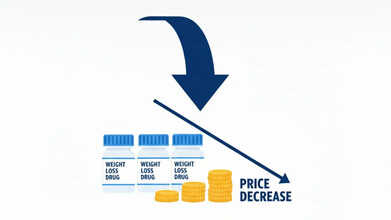- Health Conditions A-Z
- Health & Wellness
- Nutrition
- Fitness
- Health News
- Ayurveda
- Videos
- Medicine A-Z
- Parenting
- Web Stories
'Cut Your Risk' Of Stroke, Dementia And Depression By Modifying These 17 Factors

As we all age, the global population ages too, and so does the incidence of age-related brain disorders. More than 55 million persons now suffer from dementia and this number is likely to almost triple by 2050. Deaths due to stroke are likely to double and 10% to 20% of elderly persons suffer from late-life depression—a triple burden that affects quality of life, families, and healthcare systems globally.
But there is a silver lining: most of these conditions are not unavoidable. In an extensive review published in the Journal of Neurology, Neurosurgery, and Psychiatry, researchers at Mass General Brigham have identified 17 modifiable risk factors that connect stroke, dementia, and late-life depression. The research finds that changing even a few of these lifestyle and behavioral factors might decrease the risk of all three conditions—emphasizing the need for urgent preventive brain care measures.
Why Lifestyle Changes Matter More Than You Think?
Genetics and age do play a part, but this new study reaffirms that environmental and lifestyle factors have a significant impact on brain health outcomes. Dr. Sanjula Singh, the principal investigator in the Brain Care Labs at Massachusetts General Hospital, stressed, "There are many different steps individuals can take to lower their risks for these age-related brain diseases. The hopeful message here is that change is possible."
The researchers performed a systematic review of 59 meta-analyses—summaries of data from multiple studies done between 2000 and 2023. They aimed to find risk factors that are modifiable and common among at least two of the three conditions: stroke, dementia, and late-life depression.
What Are the 17 Modifiable Risk Factors?
These aren't just medically relevant—they're actionable.
The list includes:
- High blood pressure
- Body mass index (BMI)
- Kidney disease
- Blood sugar
- Total cholesterol
- Alcohol use
- Diet quality
- Hearing loss
- Chronic pain
- Physical activity
- Sleep quality
- Smoking
- Social engagement
- Stress management
- Cognitive stimulation
- Depressive symptoms
- Sense of purpose in life
They interlink and tend to overlap, so working on one can have a positive impact on several others.
Why Blood Pressure is The Most Important Factor?
Among all the variables examined, blood pressure was the most significant one. Adults with blood pressure levels more than 140/90 mm Hg were:
- 2 times more likely to have a stroke
- 20% more likely to develop dementia
- 16% more likely to have depression
This is an appeal. Cutting down on salt, raising potassium through proper diet, daily exercise, stress management, and treating sleep apnea are starting points. Medication from a doctor may be required for some.
Are Smoking, Sleep, and Sugar A Dangerous Threat?
Smoking strongly raises the risk of vascular injury, resulting in strokes and impaired brain function. Stopping smoking—even later in life—can significantly lower risk.
Sleep, so frequently underestimated, is an essential function in brain detoxification. Lack of sleep has been associated with cognitive impairment, depression, and metabolic syndrome. Elderly individuals need a minimum of 7 hours of quality sleep each night and must establish a regular sleep routine.
High blood sugar due to bad eating or unknown diabetes also leads to cognitive impairment. Keeping blood glucose under control by proper eating and exercise will stop both vascular and neurological injury.
Importance of Movement and Mental Engagement
Regular physical activity in the form of walking, yoga, or strength training increases blood flow to the brain, lowers stress levels, and enhances sleep. At the same time, mental activities like puzzles, reading, or acquiring a new skill keep the brain sharp.
Although it is hard to disentangle whether these habits are causes or consequences of disease, the evidence tips in favor of the advantages of physical activity.
Social and Emotional Well-Being
A sense of direction, social connections, and the capacity to cope with chronic stress are protective factors that are too often neglected. Research indicates that loneliness and social isolation raise the risk of cognitive decline and depression. Adding social interaction, volunteer activities, or group hobbies can serve as potent buffers.
In addition, left untreated, depressive symptoms can speed up neurological damage. Identifying early warning signs and seeking mental health care is critical to maintaining long-term brain health.
Given these findings, scientists have revised the Brain Care Score—a measure that assists individuals in determining their brain health in physical, lifestyle, and emotional aspects. Initially developed by the McCance Center for Brain Health, this 21-point score now includes new knowledge in the form of pain, symptoms of depression, hearing impairment, cognitive activity, and kidney function.
While more randomized controlled trials are necessary to evaluate interventions utilizing the score, it provides an encouraging foundation upon which clinicians and individuals can start.
TrumpRx: Will Trump’s New Website Make Prescription Drugs More Affordable?

Credits: PTI
TrumpRx: US President Donald Trump had announced this week that his administration plans to roll out a new website, called TrumpRx, which will allow Americans to purchase prescription medications from pharmaceutical companies at discounted rates.
In a major step to address rising drug costs, the Trump administration also unveiled agreements with Eli Lilly and Novo Nordisk to reduce prices for popular GLP-1 medications like Ozempic, Wegovy, and Zepbound. These deals, part of the TrumpRx initiative, are expected to make the drugs more affordable for Medicare, Medicaid, and direct consumers starting in 2026.
Trump Annoucement Today: What Is TrumpRx?
TrumpRx is an online platform designed to let consumers buy prescription medicines directly from the manufacturers, bypassing insurance intermediaries. The website is scheduled to launch in early 2026. Users will be able to search for the specific drug they need and be directed to the drug’s manufacturer, according to USA Today. The platform will offer prices closer to what national health services pay in other countries, following the principle of “most favoured nation” pricing. Medicaid beneficiaries—federal insurance for low-income adults and children—will also have access to the platform.
TrumpRx: Will The New Website Slash Prescription Drug Prices?
The website is part of a broader effort by Trump to curb high prescription drug costs in the US. In July, he sent a letter to the CEOs of 17 pharmaceutical companies demanding lower prices.
In the letter, he outlined several key points:
- Manufacturers must provide MFN (most favoured nation) prices to all Medicaid patients.
- Companies must ensure that new drugs are not sold at lower prices in other developed nations than in the US.
- Manufacturers will have an option to sell directly to patients, cutting out middlemen, but prices cannot exceed the lowest rates in other developed countries.
- Trade policies will be leveraged to support higher international pricing, with any additional revenue abroad reinvested to reduce costs for American consumers and taxpayers.
TrumpRx: Who Will Benefit Most From This Platform?
Anyone looking to buy prescription drugs directly from manufacturers, rather than through insurance, could benefit. A 2024 US Census Bureau report noted that 8% of Americans (about 26 million people) lacked health insurance in 2023, meaning they could significantly benefit from lower prices. Medicaid may also benefit, as its deal with Pfizer offers better pricing terms. Details about how this part of the program will work are not fully clear yet. Since most Americans rely on insurance for healthcare, experts believe initial adoption of the site may be limited.
TrumpRx: Trump Announces Deal With Drugmakers to Lower Cost of Weight-Loss Drugs
On Thursday, President Trump announced deals with Novo Nordisk and Eli Lilly to cut costs for the lowest doses of their popular weight-loss drugs, lowering barriers for new patients seeking treatment. Beyond government programs, the same GLP-1 drugs will be available directly to consumers via TrumpRx.gov, launching in January 2026.
The starting doses of injectable Wegovy and Zepbound will cost $350 per month but are expected to trend down to $245 over two years. Oral versions, including Novo Nordisk’s upcoming semaglutide pill and Eli Lilly’s orforglipron, will start at $149 per month once approved.
Trump Strikes Agreement To Cut Costs of Popular Weight Loss Drugs: All You Need to Know

Credits: Canva
Trumprx: President Donald Trump on Thursday unveiled agreements with Eli Lilly and Novo Nordisk aimed at cutting the prices of some of their obesity medications, including upcoming pills. The move is designed to make these expensive, blockbuster treatments more accessible to Americans.
Trump Announcement Today: GLP-1 Drugs to Become Affordable for Medicare and Medicaid Beneficiaries
The deals will reduce costs for GLP-1 drugs for Medicare and Medicaid recipients starting in 2026. The Trump administration also plans to sell the medications directly to consumers at a discount via a new website, TrumpRx.gov, launching in January. For the first time, Medicare will cover obesity treatments, which could encourage private insurers to follow suit. Certain Medicare patients will pay just $50 per month for all approved GLP-1 therapies, including those for diabetes and obesity, as per USA Today.
Trumprx: Wegovy, Zepbound, and Upcoming Pills Set for Price Cuts
Starting doses of upcoming obesity pills from Eli Lilly and Novo Nordisk, pending approval, will cost $145 per month for those using Medicare, Medicaid, or TrumpRx. Novo Nordisk’s oral version of Wegovy may enter the market by year-end, while Eli Lilly’s pill, orforglipron, could launch next year. Existing injections, such as Wegovy and Zepbound, will be available at $350 per month on TrumpRx, trending down to $245 per month over two years, as per NBC News.
Trump highlighted that these drugs have rarely been covered by Medicaid and were previously not covered by Medicare for weight loss. “They’ve often cost consumers more than $1,000 per month… That ends starting today,” he said.
Trump Announcement: Most Favoured Nation Policy Expands Access
The announcements are part of the Trump administration’s ongoing push to tie U.S. drug prices to the lowest international costs under the most favored nation policy. Trump has previously reached similar deals with Pfizer, AstraZeneca, and EMD Serono.
HHS Secretary Robert F. Kennedy Jr. said this move will have a “dramatic effect on human health,” noting that all Americans, including those not on Medicaid or Medicare, will benefit from lower GLP-1 drug prices.
Eligibility and Coverage Under Medicare
- Medicare coverage will prioritize three groups:
- Overweight patients (BMI >27) with prediabetes or cardiovascular disease.
- People with obesity (BMI >30) and uncontrolled hypertension, kidney disease, or heart failure.
- Individuals with severe obesity (BMI >35).
About 10% of Medicare beneficiaries are expected to qualify for GLP-1 therapy for obesity, cardiovascular, and metabolic benefits.
Eli Lilly and Novo Nordisk Commit To Expanded Discounts
Eli Lilly and Novo Nordisk also agreed to extend lower government pricing to all 50 Medicaid programs, provide most favored nation pricing on new medicines, and offer similar discounts on their existing drugs via TrumpRx.
Eli Lilly will additionally reduce prices on its direct-to-consumer platform, LillyDirect, where Zepbound will be available starting at $299 per month for the lowest dose. Eli Lilly’s upcoming pill will start at $149 per month.
Background on Obesity Drug Coverage
Previous efforts to cover obesity drugs under Medicare, including a proposal by former President Joe Biden, were not finalized due to costs and controversy. Health experts argue that broader access could reduce long-term expenses related to obesity-related conditions.
Semaglutide is also slated for Medicare price negotiations under the Inflation Reduction Act, while tirzepatide, the active ingredient in Zepbound, may not be part of such negotiations until the decade’s end.
Wegovy and Zepbound Weight Loss Drug Prices May Soon Fall In The US: Here’s What You Should Know

Credits: Canva
Wegovy: Eli Lilly and Novo Nordisk are reportedly preparing to finalize agreements with the Trump administration that could significantly reduce the cost of their blockbuster weight loss medications in return for Medicare coverage, according to a White House source quoted by Reuters on Tuesday.
Patients in the United States pay some of the highest prices in the world for prescription drugs—often nearly triple what consumers in other developed nations spend. President Donald Trump has been urging major pharmaceutical companies to bring prices down to align more closely with global standards.
Trumprx: Cost of Weight Loss Drugs Is Finally Dropping
Two of the most sought-after medications, Wegovy and Zepbound, currently cost more than $1,000 a month at list price. The high cost has made them unaffordable for many Americans, especially those without insurance or whose plans do not cover the drugs. A survey by the health policy group KFF in May 2024 found that about half of adults taking these medications find it difficult to manage the expense.
However, that may soon change. The Trump administration is expected to unveil a new deal with Eli Lilly and Novo Nordisk that would cut the monthly price of certain weight loss drugs to under $150. The official announcement is set for November 6, marking a major step toward making these treatments more accessible.
What Price Cap Did Trump Negotiate for Weight Loss Drugs?
According to reports from Endpoints News and The Wall Street Journal, the agreement would set the lowest dose of Lilly’s and Novo’s weight loss drugs at $149 per month. In exchange, the companies would gain Medicare coverage for their products—a milestone for obesity treatments, which are not currently included under Medicare.
Both Lilly’s Zepbound and Novo’s Wegovy have been immensely popular but remain out of reach for many due to high prices and inconsistent insurance coverage.
TrumpRx to Offer Discounted Weight Loss Drugs?
Separately, The Wall Street Journal also noted that the administration is working on an additional deal with both drugmakers to sell select obesity medications directly through the upcoming TrumpRx platform, a government-run consumer site expected to launch in 2026. This would follow previous arrangements where other discounted drugs were offered through federal programs.
President Trump has consistently pushed for most favored nation pricing, a policy aimed at ensuring Americans pay no more than citizens of other advanced economies. On September 30, he announced such a deal with Pfizer, reducing Medicaid drug costs.
In another move, he recently confirmed that EMD Serono, the country’s largest fertility drug maker, had agreed to lower the price of a common IVF medication, continuing his administration’s push to reduce the cost of essential treatments.
Insurance Coverage Still Uneven
Although many insurance plans cover GLP-1 drugs when prescribed for diabetes or heart disease, more than half of employer-based plans still do not extend coverage to obesity-related prescriptions.
In 2024, about 44% of large employers offered coverage for GLP-1 drugs used for weight loss, compared to 41% in 2023, according to data from Mercer, a benefits consulting firm.
This potential price cut could therefore play a crucial role in bridging that gap—making effective weight loss medications accessible to a wider group of Americans.
© 2024 Bennett, Coleman & Company Limited

